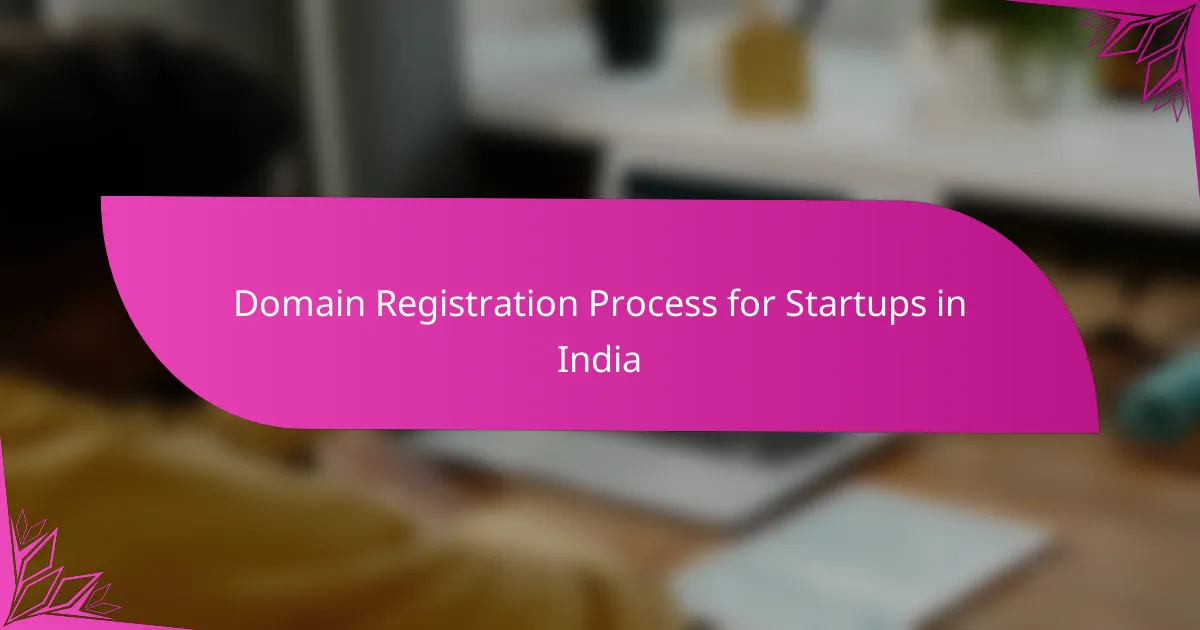The domain registration process for startups in India is essential for establishing a unique online presence. By following a series of straightforward steps, entrepreneurs can secure a domain name that reflects their brand and business objectives. With various reliable registrars available, startups can choose options that fit their budget and requirements while being mindful of associated costs.
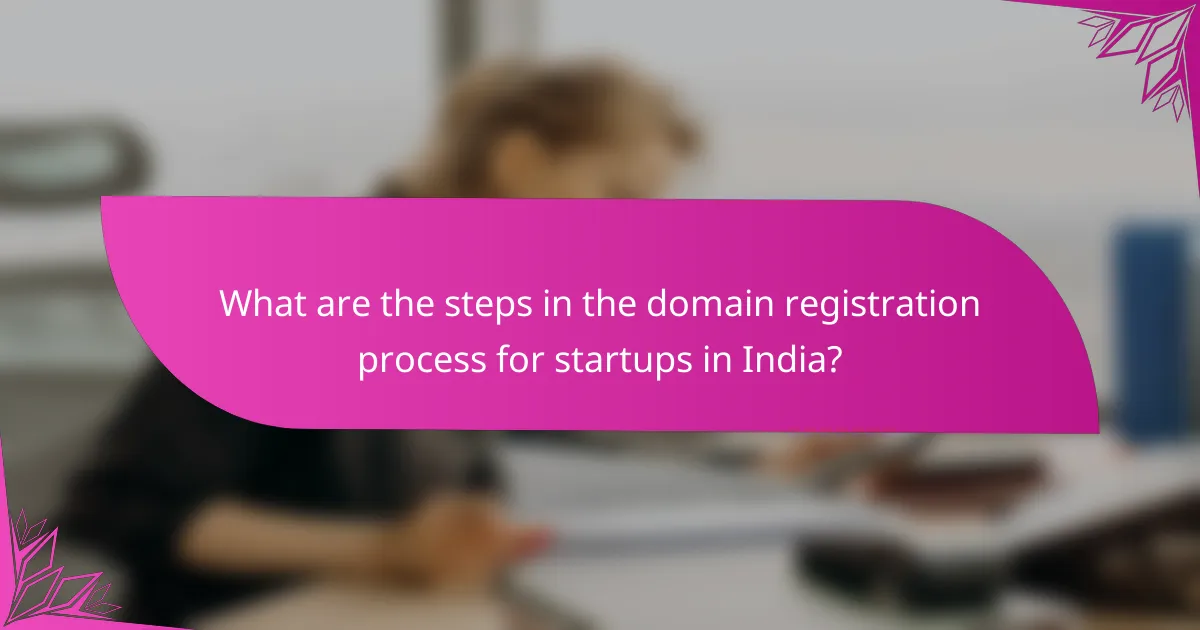
What are the steps in the domain registration process for startups in India?
The domain registration process for startups in India involves several key steps that ensure you secure a unique online identity. By following these steps, you can effectively register a domain name that aligns with your business goals.
Choose a domain name
Choosing a domain name is the first and crucial step in the registration process. It should be memorable, relevant to your business, and ideally include keywords related to your industry. Aim for a name that is short, easy to spell, and pronounce.
Consider using popular domain extensions like .com, .in, or .co.in, which are widely recognized in India. Before finalizing, check for existing trademarks to avoid legal issues.
Select a domain registrar
Once you have a domain name in mind, the next step is to select a domain registrar. Look for registrars that are accredited by the Internet Corporation for Assigned Names and Numbers (ICANN) or the National Internet Exchange of India (NIXI).
Compare pricing, customer support, and additional services like web hosting or email accounts. Popular registrars in India include GoDaddy, BigRock, and Namecheap.
Complete the registration form
After selecting a registrar, fill out the registration form with your details. This typically includes your name, address, email, and phone number. Ensure that the information is accurate, as it will be used for domain ownership verification.
Some registrars may also ask for additional information, such as your business registration details if you are registering as a company. Keep your contact information up to date to avoid losing your domain.
Make the payment
Once the registration form is completed, proceed to make the payment. Domain registration costs can vary widely, typically ranging from a few hundred to a few thousand Indian Rupees per year, depending on the registrar and the domain extension.
Most registrars offer various payment methods, including credit/debit cards and online wallets. Be sure to check for any hidden fees or renewal costs before confirming your purchase.
Verify the domain ownership
After payment, you will need to verify your domain ownership. This usually involves confirming your email address through a verification link sent by the registrar. Completing this step is essential to ensure that your domain is registered in your name.
Failure to verify your ownership may result in losing the domain or facing issues with domain management. Keep an eye on your email for any verification requests after registration.
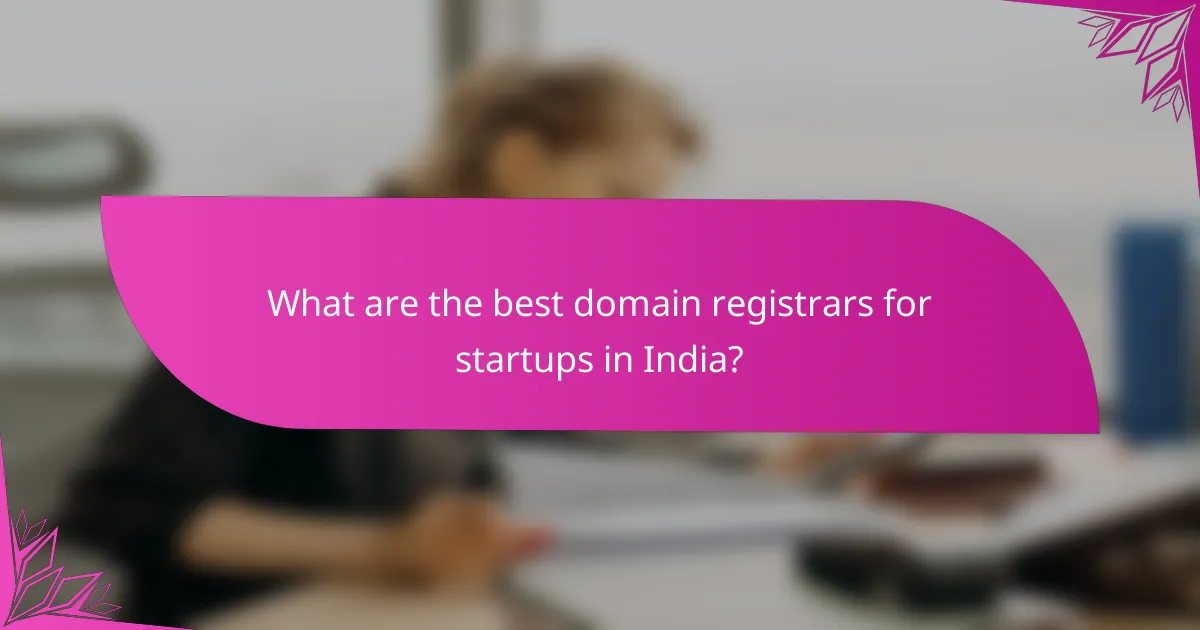
What are the best domain registrars for startups in India?
Startups in India can benefit from several reliable domain registrars that offer competitive pricing, user-friendly interfaces, and essential features. Key players include GoDaddy, Namecheap, BigRock, and Hostinger, each catering to different needs and budgets.
GoDaddy
GoDaddy is one of the largest domain registrars globally and is highly popular in India. It offers a wide range of domain extensions and additional services like web hosting and email accounts, making it a convenient choice for startups looking for an all-in-one solution.
Pricing for domain registration typically starts at around INR 500 per year, depending on the extension. Be aware of renewal costs, which can be higher than the initial registration fee. GoDaddy frequently runs promotions, so checking for discounts can save money.
Namecheap
Namecheap is known for its competitive pricing and excellent customer support. It provides a straightforward interface for domain registration and management, which is ideal for startups that may not have extensive technical expertise.
Domains can be registered for as low as INR 300 per year, and Namecheap often includes free WHOIS privacy protection, which is beneficial for maintaining your startup’s confidentiality. Their renewal rates are generally reasonable, making it a cost-effective option in the long run.
BigRock
BigRock is a popular choice among Indian startups, offering a variety of domain extensions at affordable prices. It provides localized support and services tailored to the Indian market, which can be advantageous for new businesses.
Domain registration prices start around INR 500 per year, and BigRock often has special offers for first-time customers. They also provide additional services like web hosting and SSL certificates, which can be bundled for added savings.
Hostinger
Hostinger is primarily known for its web hosting services but also offers domain registration at competitive rates. This can be particularly useful for startups looking to establish their online presence quickly and affordably.
Domain prices at Hostinger start at approximately INR 199 per year, making it one of the more budget-friendly options. Their hosting plans often include a free domain for the first year, providing additional value for startups aiming to minimize initial costs.

What are the costs associated with domain registration in India?
The costs associated with domain registration in India typically include registration fees, renewal fees, and optional privacy protection costs. Understanding these expenses is crucial for startups to budget effectively and ensure their online presence remains secure.
Registration fees
Registration fees for a domain in India can vary significantly based on the domain extension (TLD) you choose, such as .com, .in, or .co.in. Generally, these fees range from around INR 500 to INR 2,500 per year, depending on the registrar and the specific TLD.
When selecting a registrar, consider not only the initial registration fee but also the services included, such as customer support and additional features. Some registrars may offer promotional rates for the first year, so it’s wise to compare options before committing.
Renewal fees
Renewal fees for domains are usually similar to registration fees but can sometimes be higher. Expect to pay between INR 500 and INR 3,000 annually, depending on the TLD and the registrar’s policies.
It’s important to keep track of renewal dates to avoid losing your domain. Many registrars offer auto-renewal options, which can help prevent accidental lapses in registration.
Privacy protection costs
Privacy protection, also known as WHOIS protection, is an optional service that keeps your personal information private in the domain registration database. This service typically costs between INR 200 and INR 1,000 per year.
Investing in privacy protection can be beneficial for startups, as it helps shield sensitive information from potential spammers and malicious actors. Evaluate your need for this service based on your business model and online presence strategy.
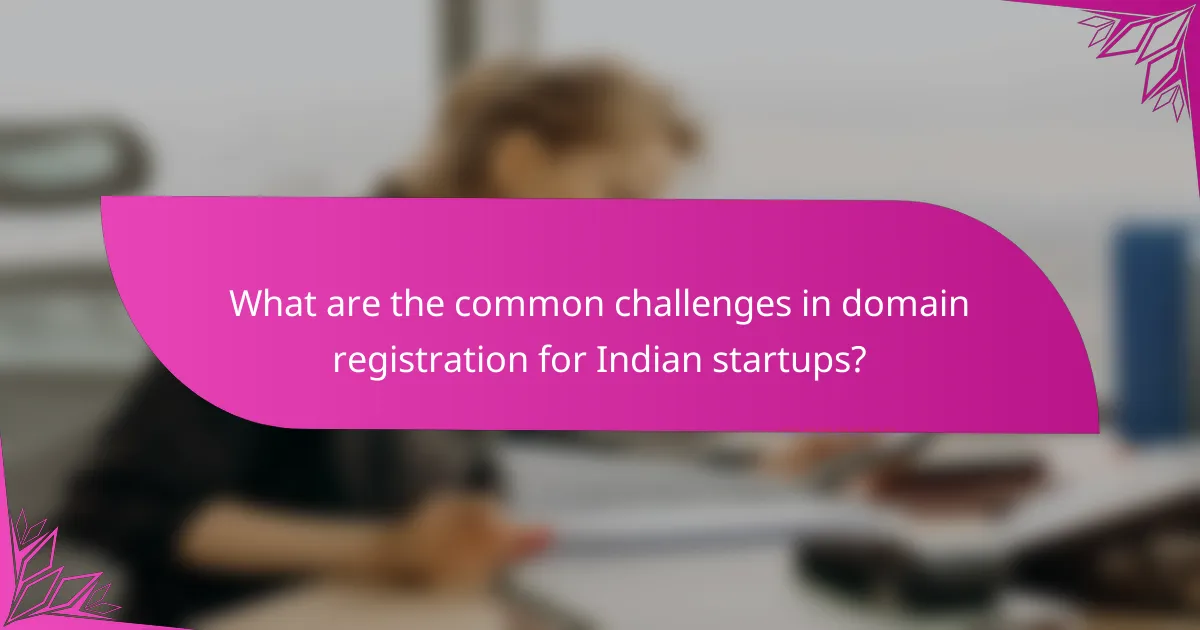
What are the common challenges in domain registration for Indian startups?
Indian startups often face several challenges during the domain registration process, including issues with name availability, selecting a reliable registrar, and understanding various domain extensions. These obstacles can lead to delays and complications that may impact the startup’s online presence.
Domain name availability
One of the primary challenges is ensuring that the desired domain name is available. Many startups struggle to find a unique name that reflects their brand while still being accessible. Conducting thorough research on domain name availability is essential, as popular names may already be registered.
Using domain name generators or brainstorming creative alternatives can help in this regard. It’s also wise to consider variations in spelling or different domain extensions to increase the chances of finding an available name.
Registrar reliability
Selecting a reliable domain registrar is crucial for a smooth registration process. Startups should look for registrars with a good reputation, transparent pricing, and strong customer support. Reading reviews and comparing services can help identify trustworthy options.
Additionally, it’s advisable to check if the registrar offers features like domain privacy protection and easy domain management tools. Avoid registrars with hidden fees or poor customer service, as these can lead to complications down the line.
Understanding domain extensions
Domain extensions, such as .com, .in, or .co.in, play a significant role in branding and search engine optimization. Startups should carefully consider which extension best suits their business model and target audience. For instance, .in is ideal for businesses targeting Indian customers, while .com has a more global appeal.
It’s important to understand the implications of different extensions, including potential costs and renewal fees. Startups should also be aware of new and emerging extensions that may align well with their brand identity, providing more options for a unique online presence.
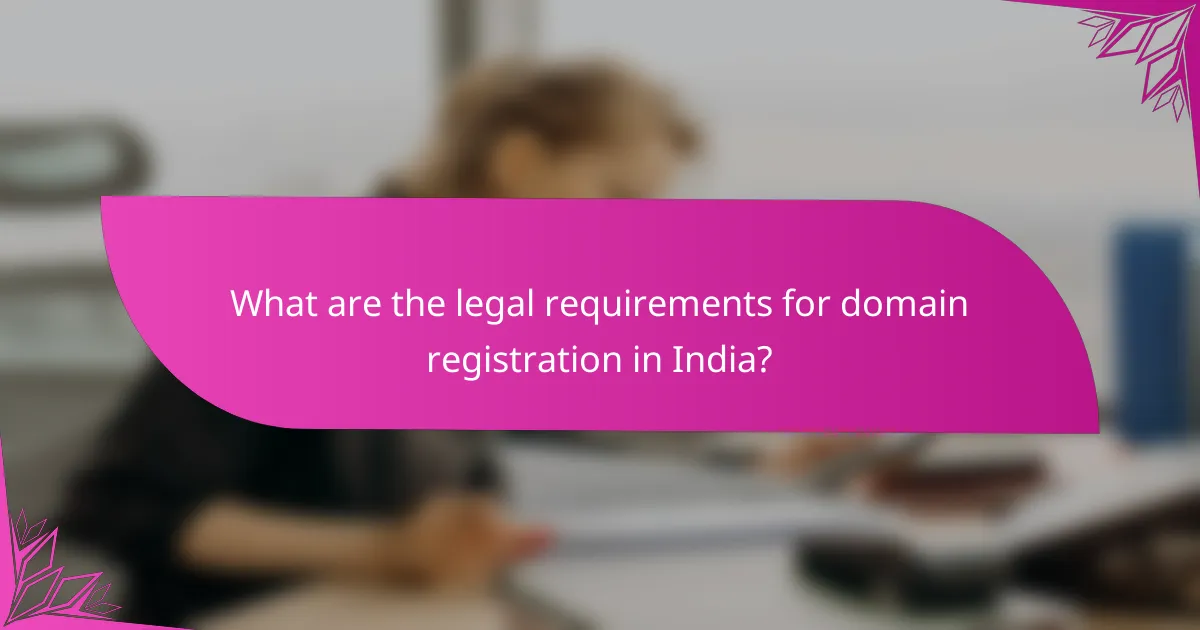
What are the legal requirements for domain registration in India?
In India, the legal requirements for domain registration include having a valid identity proof and address proof, which can be in the form of government-issued documents. Additionally, registrants must comply with the guidelines set by the Internet Corporation for Assigned Names and Numbers (ICANN) and the National Internet Exchange of India (NIXI).
Eligibility Criteria
To register a domain in India, individuals or businesses must meet specific eligibility criteria. For instance, Indian citizens can register domains under their name, while companies must provide their registration details. Foreign entities can also register domains, but they may need to appoint a local representative.
Required Documentation
When registering a domain, you will need to submit certain documents. Commonly required documents include a government-issued photo ID (like an Aadhar card or passport) and proof of address (such as a utility bill). For businesses, a certificate of incorporation and a PAN card may also be necessary.
Domain Name Regulations
Domain names in India must adhere to specific regulations. They should not contain special characters or spaces and must be between two to sixty-three characters long. Additionally, the name should not infringe on existing trademarks or copyrights, which could lead to legal disputes.
Registration Process
The domain registration process in India typically involves selecting a domain name, checking its availability, and submitting the required documents through a registrar. Payment for the domain registration fee, which can range from a few hundred to several thousand Indian Rupees depending on the domain extension, is also required.
Renewal and Maintenance
Once registered, domains must be renewed periodically, usually every year. Failure to renew can result in loss of ownership. It’s advisable to set reminders for renewal dates and ensure that your contact information with the registrar is up to date to avoid any issues.
